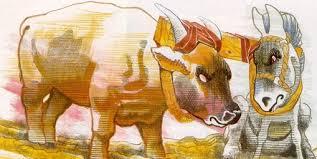Israelite Distinctiveness
22: 9-11
Israelite distinctiveness DIG: Why was Isra’el to maintain her distinctiveness? Why do you think the Ruach Ha’Kodesh inspired Moses to write about the same three mitzvot in two different books?
REFLECT: As a believer, how do you demonstrate your distinctiveness to those in your family, in your neighborhood, at work, to those you meet along the way, or to the world?
Isra’el was to maintain her distinctiveness; she was not to imitate worldly practices.
While several of the mitzvot grouped in 22:1-12 refer to mankind’s relationships with our neighbors, there are also mitzvot about the care of animals and birds. The impression remains that the Second Address: The Specific Stipulations of the Covenant (12:1 to 26:19), covers a wide range of topics. The present group of eleven mitzvot in 22:1-12 make it clear that the scope of ADONAI’s concern for proper treatment in the covenant community was just as wide. There was to be a wholehearted application of the Torah. In these next twelve verses, much of them are concerned with the love that should be shown to other members of the covenant community (Deuteronomy 15:1-18; Leviticus 19:1-37). While the brief statement: Love your neighbor as yourself (Leviticus 19:18; Matthew 22:39), does not occur in Deuteronomy, it is implied here, and in many parts of the book. The covenant mitzvot was comprehensive in its demand for love. The love of YHVH, and the love for one’s neighbors.480
Because the Israelites were God’s chosen people (14:12), separated from other nations, practices that were acceptable in pagan cultures were prohibited to the Jews. ADONAI set apart the priests and Levites to teach the people how to know right from wrong and the clean from the unclean, and this helped the people develop discernment. As they obeyed YHVH and sought His blessing, they learned more and more about what was fitting and proper in Jewish society. However, ultimately, the nation decayed spiritually because the priests and Levites failed to do their job, and the Israelites began to imitate their heathen neighbors (Ezeki’el 22:23-29, 44:23).481
These three mitzvot have a counterpart in Leviticus, “You must keep my statutes. You are not to crossbreed different kinds of animals. You are not to sow your field with two kinds of seed, nor are you to wear a garment woven of two kinds of material” (Leviticus 19:19). The Leviticus passage is more general, whereas here in Deuteronomy, it is more specific.
8. You are not to plant your vineyard with two kinds of seed, lest (Hebrew: pen, meaning or, otherwise) the whole harvest will be forfeited – both the seed you plant and the produce of the vineyard (22:9). It would have prohibited the Egyptian practice of planting vegetables in a vineyard between rows of vines or perhaps mixing vines with other fruit trees in the same vineyard. There are a number of Egyptian paintings, from the Eighteenth and Nineteenth Dynasty tombs, showing gardens and orchards in which various types of fruit-bearing trees are in vineyards. The sense seems to be that the violation of this mitzvah would have resulted in the whole harvest being forfeited as if it were under the cherem judgment (Joshua 6:18-19).482 The first-fruits would not have been accepted by YHVH, and therefore the entire harvest would have been useless.

9. You are not to plow with an ox and a donkey together (22:10). One is stronger than the other, and one will work harder and tire very fast. The ox was clean, and the donkey unclean. Initially the animals were given to mankind to help, but they could be easily abused. So, this commandment reminds us that they are God’s creation. A righteous man cares for the life of his animal; know the condition of your flocks, pay attention to your herds (Proverbs 12:10a, 27:23). The Sabbath was not only made for mankind. The animals were also to have rest (Exodus 20:10).483
10. You are not to wear a woven mixture, wool and linen together (22:11). Again, this was practiced in Egypt. The word a mixed material, sha’atnez, which is not Hebrew, appears to be a word taken from Egyptian. It may be noted that during the Eighteenth Dynasty, various complicated types of pattern weaves were being introduced in Egypt. As a result, they were to be detestable to the Israelites.484 The rabbis declared that pious Jews would not sew a garment of wool with a linen thread, and that if one saw an Israelite wearing a garment of mixed cloth, it was lawful for him to fall on him and tear the forbidden garment to pieces.
Dear Heavenly Father, Praise You that You are so loving and wise! You created the world with just words and everything You made was perfect the first time (Genesis 1:31). You also understand how all that You made should fit together, or not be put together. You know everything! Messiah. In Him all the treasures of wisdom and knowledge are hidden (Colossians 2:2c-3). We can rest confidently in trusting that as we follow Your guidance, we will be doing what is wisest. Thank You for caring so much for Your creation. In Yeshua’s holy name and His power of resurrection. Amen



Leave A Comment